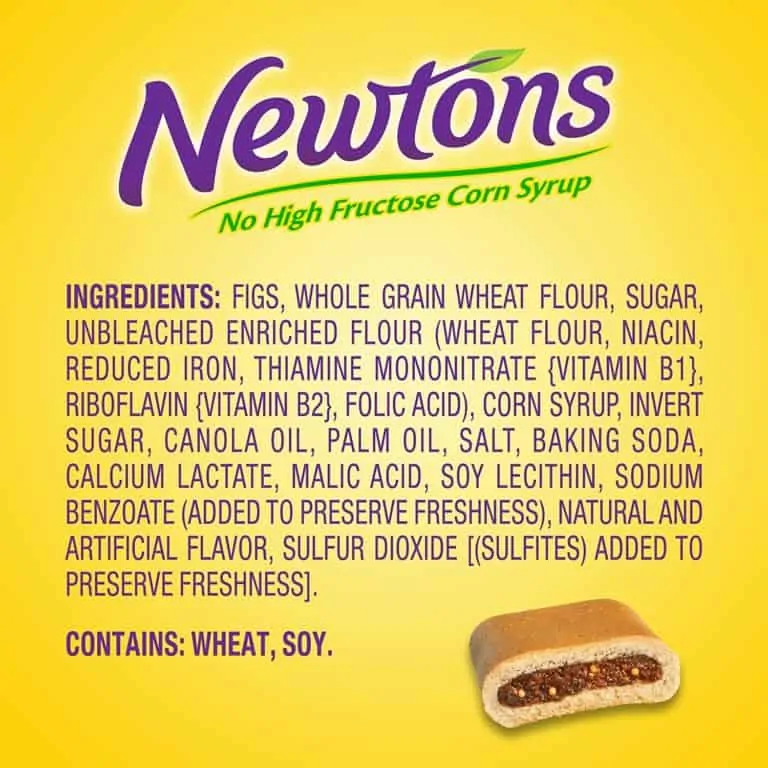As a lover of Fig Newtons, you might want them to be a part of your new vegan lifestyle. Imagine the juicy fillings bursting in your mouth and tantalizing your taste buds for more. There is no end to delicious snacks like these.
But are Fig Newtons vegan?
Yes, Fig Newtons are generally considered vegan-friendly as they do not contain any ingredients derived from animals. However, it’s essential for vegans to check the specific ingredients and manufacturing practices to ensure they meet their individual criteria.
Essentially, Fig Newtons’ vegan status depends on individual interpretations and strictness of vegan principles. Some strict vegans believe that Fig Newtons contain some direct non-vegan ingredients. And a portion of vegans doesn’t consider figs vegan altogether.
In 2023, we have thoroughly explored the ingredients in Newton Figs for you, so we can guide you in making a conscious choice that aligns with your vegan lifestyle and values. Let’s take a closer look!
Prices pulled from the Amazon Product Advertising API on:
Product prices and availability are accurate as of the date/time indicated and are subject to change. Any price and availability information displayed on [relevant Amazon Site(s), as applicable] at the time of purchase will apply to the purchase of this product.
Are Fig Newtons dairy-free?
Yes. Fig Newtons did include whey as an ingredient in the past. However, their newest list of ingredients confirms that there are no dairy-derived products in Fig Newtons. Therefore, Fig Newtons are indeed dairy-free.
Made with a combination of wheat flour, sugar, figs, vegetable oils, and other plant-based ingredients, Fig Newtons are suitable for vegans. It’s important to note that while they do not contain dairy, they may still have some ingredients that strict vegans prefer to avoid. So, if you’re looking for a dairy-free treat, Fig Newtons are a delicious option to consider.
Do Fig Newtons contain gelatin?
No, Fig Newtons do not contain gelatin. Even though Fig Newtons have the perfect gelatinous texture, the manufacturers attain it through the fiber naturally present in the fig fruit.
Gelatin is a substance made by boiling pig and cattle bones, tendons, ligaments, and skins in water. Fish are also often used in this process. This product of animal-cruelty is used by manufacturers to give their food a chewy and soft texture, just the way Fig Newton is on the inside.
It is very common to find gelatin in food products these days. Be it seemingly innocent frosted breakfast cereal or fruit-filled candy like Starburst. It is often surprising for vegans to find gelatin listed behind the most unexpected food items. If you begin counting how many packed foods you have eliminated because of the presence of gelatin, you’d come up with a new name every time you think you have listed all of them.
Instead of gelatin, Fig Newtons use a small amount of pectin, a plant-based soluble fiber extract that functions similarly in chewy foods.
Do Fig Newtons contain egg albumin?
No. After our investigation, we can confirm that Fig Newtons don’t contain egg albumin. Although it is extremely common for manufacturers to employ egg albumin in their food products, this is not the case with Fig Newtons.
Many vegans ponder whether Fig Newtons also contain egg albumin to attain the gel consistency they are so popular for. Albumin is used as an aerator while making cookies and fruity candies to attain the ideal chewy texture. Neither the cookie portion nor the gel portion of Fig Newtons contains albumin.
Hence, there are no direct non-vegan ingredients in Newton Figs. So if you are a fan of these juicy gel-filled little cookies, you might as well carry on.
Controversial Ingredients in Fig Newtons

Fig Newtons include controversial ingredients that some individuals may find problematic including:
- figs themselves
- palm oil
- processed sugar
- natural and artificial flavors
- added colors.
1. Figs as controversial fruit
While figs are a favorite fruit for many people, many vegans don’t consider them vegan. This is because figs contain remains of dead wasps.
A particular variety of wasps that is responsible for pollinating figs is often trapped inside the fruit in the process. The trapped insect is then broken down by the protein-digesting enzymes present inside the fruit.
Strict vegans say that this is not the same as eating other fruits and vegetables due to the presence of trapped insects. They argue that insects are animals, and eating figs could involve the consumption of “dead bodies” of these insects within the fruit.
> Read more: Are figs vegan?
As vegans ourselves, we believe that figs shouldn’t be a topic of debate. Embracing a vegan lifestyle doesn’t mean sacrificing practicality; instead, it involves making mindful choices that align with our values. The process by which the insect gets trapped in the fruit is natural and mutually beneficial to both species. This is quite unlike killing animals and consuming their meat.
In recent times, many modern farms have made significant advancements in horticulture, cultivating a new commercial variety of fig that addresses the concerns surrounding wasp presence.
Do Fig Newtons have wasps in them?
While there is no clear evidence that wasps are present in Fig Newtons, this is something to consider if you are a strict vegan. However, some vegans believe wasps may be present in Fig Newtons because some species of fig are pollinated by wasps, which die during the natural pollination process.
2. Palm oil
As vegans, we believe it is crucial to consider environmental damage and ethical cruelty as equally devastating as animal cruelty. The issue with palm oil goes beyond just its origin from palm plants; it involves the large-scale commercial plantations that prioritize profits at the expense of nonrenewable tropical rainforests.
Recent attention has shed light on the inhumane practice of large-scale deforestation to clear land for these capitalist palm plantations. This not only contributes to global warming but also poses a threat to the lives of countless innocent inhabitants of these forests. Rare plant species have been lost, and animals like the Orangutan have been displaced and pushed to the brink of extinction.
Palm oil is environmentally devastating. The dead remains of these plantations release methane gas, which is even more harmful than carbon dioxide in causing the greenhouse effect.
As ethical consumers, we should be aware of the practices of the brands we support. It’s important to consider what goes on in palm plantations, where poor bonded laborers from underdeveloped countries often toil in harsh conditions for meager pay and inadequate living standards. Their futures and those of their families are compromised, trapped in a cycle of poverty and unfairness.
As vegans, it is our ethical responsibility to make informed choices and refrain from consuming products that contribute to such environmental destruction and human suffering. By being mindful of our purchasing decisions, we can strive to make a positive impact on the world around us.
3. Processed sugar
Fig Newtons are amongst the sweetest snacks you’d come across. They obviously contain a whole lot of processed sugar. You must be aware, quite many sugar mills in America use bone char for refining and filtering their cane sugar.
Bone char is a product of animal-cruelty made by burning animal bones at very high temperatures in combustion chambers. Bone char is used to absorb all impurities and unwanted colors from the original brown cane sugar. The final filtered and bleached sugar is thus pristine white in coloration.
Many vegans do not consume processed sugar for this very reason. They prefer organic or unfiltered sugar so that they don’t have to compromise. Since there could be bone char filtered cane sugar in packed food items, they choose to avoid their consumption altogether.
This may be considered an extreme step because not all sugar in America is filtered using bone char. Many sugar mills use granular activated charcoal instead of bone char. Some sugar factories do not produce sugar from cane at all. They use coconut and beet to obtain their sugar.
Since you never know where the sugar actually comes from, complete eradication of sugar may be an extreme step.
4. Natural and artificial flavors
As vegans ourselves, we understand the concerns surrounding natural and artificial flavors. It’s frustrating to know that the origin of these flavors in Fig Newtons, and many other products, is often shrouded in mystery. The fact that the FDA allows natural flavors to be derived from both plant-based and animal-based sources adds to the uncertainty.
5. Food dyes
Red 40 is often considered a vegan food colorant because of its basis of origin. It is obtained from petroleum. It’s crucial not to confuse it with Red 4, another food dye obtained from crushed insects, as that wouldn’t align with our vegan values.
However, the concerns with food dyes go beyond their origins. All food colorants, including those considered vegan, undergo testing on animals in laboratories to ensure human safety. This practice involves subjecting animals to harmful experiments, and sadly, many of them don’t survive. The ones that do often suffer from complications and are eventually euthanized to avoid the burden of treatment.
So, are Fig Newtons Vegan?

Fig Newtons are generally considered vegan-friendly as they do not contain any ingredients directly derived from animals. They are primarily made with figs, wheat flour, and other plant-based components, making them suitable for vegans who avoid animal-derived products.
However, for strict vegans, there are some concerns. Ingredients like palm oil, processed sugar, figs themselves, natural and artificial flavors, and food dyes might be considered non-vegan.
Ultimately, the decision to enjoy Fig Newtons depends on your individual vegan principles and comfort level with potential non-vegan ingredients. It’s important to be aware of the ingredients and make a choice that aligns with your values.












Leave a Reply